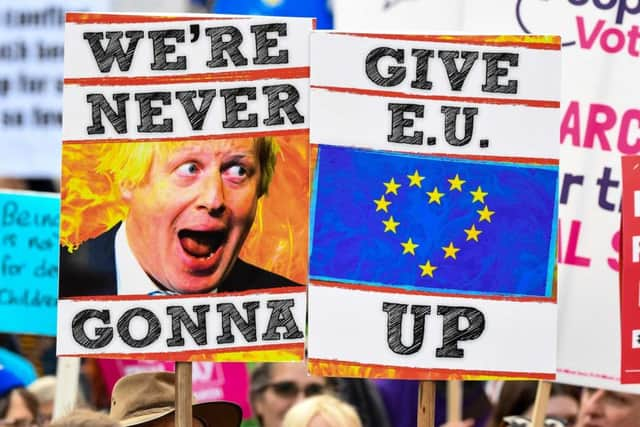Brexit: Why SNP were right to avoid indyref2 deal with Boris Johnson – Kenny MacAskill
Debates have been running in SNP circles as to whether the party’s Westminster group should’ve done a deal with the Tories and supported Brexit in return for the powers to call a second Independence referendum. Superficially it can seem attractive. This is an English Civil War and it seems the best hope’s a soft Brexit, though even that can’t be guaranteed given the attitude on both sides of the House of Commons.
Labour failing to expel MPs who trooped in to support Boris Johnson’s deal is truly incredible. The real question isn’t why they voted for it but why they were even Labour MPs in the first place, given the effect this will have on workers’ rights. They’re either delusional or have been asleep during his political journey of waffle, lying and shameless hypocrisy.
Advertisement
Hide AdAdvertisement
Hide AdSo from an SNP perspective, getting an independence referendum speedily is a prerequisite. And, indeed, it’s possible that the outcome of the looming election will simply see the Tories returned with a majority and the SNP seeking powers they might have obtained in a deal. Losing negotiating influence was therefore the argument made for the deal. There’s logic in that but the risks were too great and the price too high “to sup with the devil”.


Firstly, as the DUP have discovered, there no such thing as a deal with Johnson. He’d “sell his granny for glue” if he thought it would advance him; and he’s sold them out and Irish unionism along with it. Any agreement that the SNP might have obtained would have been as fragile, as he’s fickle. Even if a Section 30 power was ceded, his actions thereafter would have been challenging, as they will be, to be fair, if he’s returned.
Huge electoral turn-off


However, secondly and more importantly, it would have caused consternation amongst SNP members and risked a loss of electoral support, and perhaps even in a future referendum. A split would have been unlikely but a walking away by some might have occurred. Despite the shameful failure to act on Catalonia and previous failures in Greece and Ireland, support for the EU runs high. Opportunities to change from within, added to the power it can wield for small nations, evidenced by Ireland, assure that. The EU – as it is and can be – is much preferred to the UK – as it is and will be.
Likewise, as Labour are about to discover, voting with the Tories is still a huge electoral turn-off. Trying to explain that it was only a minority and that some might face deselection will have as much success as the SNP had in 1979, arguing that the Tories had reneged on devolution. Again there may be logic in the argument but the public memory is of treachery. Instead the SNP can hold their heads high. Doing a deal with the Tories would have undermined all that, irrespective of what might have been on offer.
So, the SNP may have lost that card to play but their hand will be strengthened by reinvigorated electoral success. For it’s to the polls we go. A referendum may also still come about and arguably should, but it’s not looking likely just yet. For the reality is that it’s not either/or but both that are required. One to sort out the governance of the country and the other the specific constitutional question.
A Hallowe’en nightmare
But the votes still aren’t there in the Commons for another referendum and an election it has to be. The country requires governance and the people need the chance to seek to remove this Government. What’s surprising is that it’s taken so long. Keeping Johnson in office until Hallowe’en has been the nightmare for many. All that was needed was an interim administration under Corbyn or anyone to get an extension or revoke article 50 and then call an election. The suggestion by Lib Dem Jamie Stone that he preferred “no deal” to Corbyn – later implausibly retracted – is incomprehensible to those suffering under this failing regime.
For, leaving aside Brexit, ministerial life goes on even if truncated. Most decisions in government are longer term, strategic and set a direction of travel. But some are specific and require authority which has ebbed.
The Windrush disgrace is a clear example of that ministerial discretion. Theresa May’s actions were shameful but the thought of Priti Patel making key decisions is even more frightening. The Queen’s Speech may have been a wish-list but other decisions of profound consequence to individuals and communities will be getting made.
Advertisement
Hide AdAdvertisement
Hide AdSo, an election there must be. Brexit’ll be the major debate, though a referendum may still be required, but other issues still matter. Hopefully, south of the Border they’ll consider who’s to deal with them and not just Brexit.
